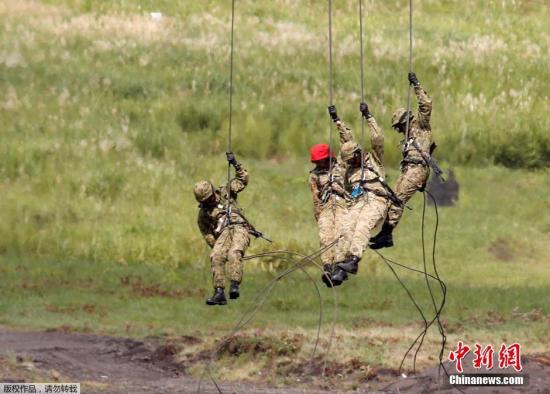Japan's ruling Liberal Democratic Party's security survey committee has drafted a number of recommendations for revising the "National Security Strategy" and other documents. The main contents include raising the proportion of defense spending to GDP from about 1% to 2% within five years. The above, can launch strikes on missile bases and headquarters of other countries.
Data map: On August 25, 2016 local time, the Japan Ground Self-Defense Force held the annual Fuji comprehensive firepower exercise at the Higashi Fuji Exercise Field in Gotemba City, Japan.
The picture shows members of the Japanese Self-Defense Force performing an airborne demonstration.
A number of Japanese media reported on the 16th that a security investigation committee chaired by former Defense Minister Onodera Gonoori put forward suggestions on the revision of the "National Security Strategy", "Defense Plan Outline" and "Mid-term Defense Force Development Plan", calling for Japan's defense spending In line with the military spending target of NATO member states, that is, the proportion of GDP in the country will reach 2%, and it will be achieved within five years.
In the 2021 election platform for the House of Representatives election, the Liberal Democratic Party proposes that the proportion of defense spending should be more than 2%.
This is the first time that the Safety and Security Survey has proposed a deadline to achieve this goal.
"The Yomiuri Shimbun" reported that the security investigation committee said that it is necessary to "fundamentally strengthen the defense force without hesitation."
Japan's total defense spending in fiscal 2021 exceeded 6 trillion yen ($47.5 billion) for the first time, increasing for the ninth consecutive year.
Some analysts believe that in recent years, Japan has continued to increase its military budget by exaggerating tensions in the surrounding areas. On the one hand, it aims to strengthen the Japan-US alliance, and on the other hand, it is constantly challenging the margins of Japan's pacifist constitution with actions.
As for the ability to "attack enemy bases", it is suggested that the target of attack should not only be limited to missile bases, but also include command and control systems.
However, the "capacity to attack enemy bases" is questioned.
According to the "Mainichi Shimbun" report, Kazuo Kitazawa, deputy representative of the Komei Party, the ruling partner of the Liberal Democratic Party, believes that the "attack" may be understood as a pre-emptive strike; the leader of the Liberal Democratic Party and Prime Minister Fumio Kishida also requested that this statement be changed.
The Safety and Security Inquiry is considering amending this statement to reflect the nature of "self-defense".
Kyodo News reported that the security investigation committee also suggested relaxing the "three principles of defense equipment transfer" on the grounds of the Russia-Ukraine conflict.
In April 2014, the Japanese government adopted the "Three Principles of Defense Equipment Transfer", which replaced the original "Three Principles of Arms Export" and greatly relaxed restrictions on the export of military equipment and technology.
However, in accordance with the provisions of the "Three Principles of Defense Equipment Transfer", the transfer of defense equipment to parties to international disputes is still prohibited.
The security inquiry is scheduled to finalize its recommendations next week and submit them to Prime Minister Fumio Kishida within this month.

